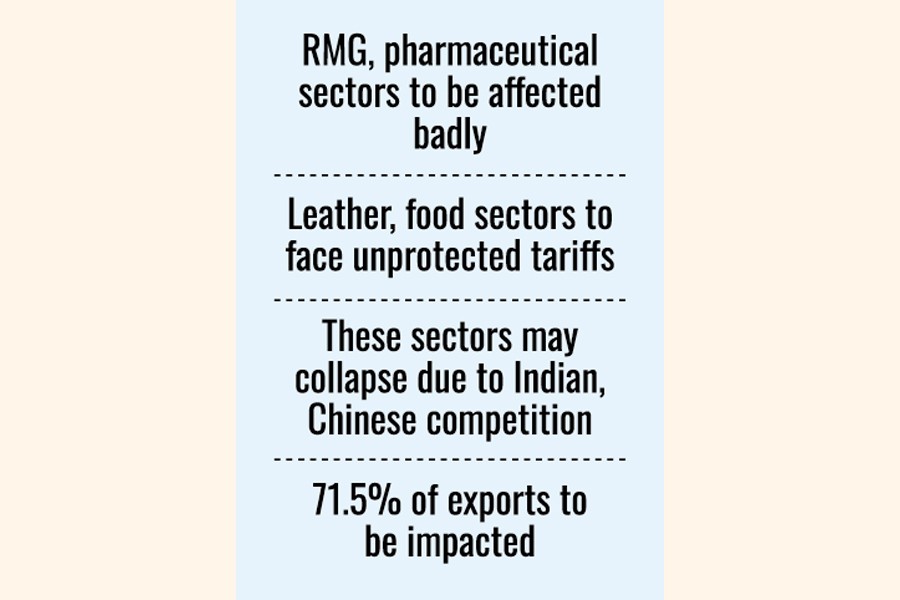
Published :
Updated :

Bangladesh's premature graduation from the least-developed country (LDC) status will raise poverty levels and affect industries, including readymade garment (RMG), experts told a roundtable on Wednesday, requesting immediate deferral of the transition.
They highlighted evidence-based decision-making, saying if the graduation happens with the existing preparedness, a number of sectors, including pharmaceutical, would bear the brunt as domestic businesses would not be able to compete with medicine imports from neighbouring India.
Due to the massive destruction in the banking sector in the last 15 years by the non-democratic regime, interest rates would increase in the next couple of years and business costs would rise in the country, they observed.
Styled "Bangladesh's LDC Graduation: Between Readiness and Reality," the roundtable was organised by local think tank Change Initiative at a hotel in the capital.
Bangladesh's LDC graduation is scheduled for November 2026.
Prof Mushtaq Khan of SOAS University of London spoke at the discussion, saying the massive trade deficit with close competitors like China and India would affect Bangladesh in case of premature graduation.
"I am an economist, and I am not confident with the evidence (of preparedness). Premature LDC graduation will raise poverty in the country," he underlined, adding, "Bangladesh is on track to graduate, but without critical homework."
Graduation will expose industries like leather and food to unprotected tariffs, risking collapse in the face of Indian and Chinese competition, he added.
Other speakers said investors do not care about the LDC badge; they care about the real cost of doing business.
Amir Khasru Mahmud Chowdhury, a member of the BNP's National Standing Committee, highlighted the oligarchy that ruined the country's economy, particularly the emptying of banks and the capital market.
He said, "We know how the gross domestic product (GDP) growth data came out, the Bangladesh Bureau of Statistics (BBS) data was manipulated, and export figures were distorted, and also all the narratives the previous government built based on those figures."
Suggesting deferral of the LDC graduation, the BNP leader said industries would be affected if graduation takes place with lapses in preparedness.
"LDC graduation cannot be built on broken systems. True transition demands people's representation in decision-making. Without democratic legitimacy, no milestone is meaningful," he added.
Estiaque Bari, head of research at Change Initiative, presented the keynote, underscoring that the upcoming LDC graduation is likely to impact 71.5 per cent of the country's exports.
Omar Farooq, additional director of research at the Bangladesh Bank, said, "With our financial sector still vulnerable and the economy facing headwinds, applying for a deferral of two to three years based on a realistic assessment seems necessary to ensure stability before undertaking this transition."
Owais Parray, country economic adviser at UNDP Bangladesh, said Bangladesh does not need just a graduation date; it needs a plan that avoids past mistakes, drives diversification, and delivers real jobs.
AKM Sohel, additional secretary and chief of the UN Wing at the Economic Relations Division, said, "The choice is ours - act now with a plan or proceed unprepared."
Among others, Nuria Lopez, chairperson at the European Union Chamber of Commerce; Cynthia Mela, country director of French Development Agency (AFD); Zonayed Saki, chief coordinator at Ganosamhati Andolan; and Sadia Farzana Dina, joint chief coordinator at National Citizen Party; spoke at the event presided by M Zakir Hossain Khan, chief executive of Change Initiative.
nsrafsanju@gmail.com


 For all latest news, follow The Financial Express Google News channel.
For all latest news, follow The Financial Express Google News channel.